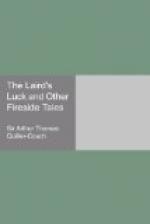“There will be wine,” said Dave, dreamily.
“Lashins of it; wine and women, and loot things. I wonder how our boys are feeling on the right? What’s that?”—as a light shot up over the ridge to the eastward. “Wish I could see what’s doing over there. My belief we’re only put up for a feint.”
“O hush it, you royal mill-clappers!” This came from the darkness behind—from some man of the 30th, no doubt.
The voice was tense, with a note of nervousness in it, which Nat recognised at once. He turned with a sudden desire to see the speaker’s face. Here was one who felt as he did, one who could understand him, but his eyes sought in vain among the lines of glimmering black shakos.
“Silence in the ranks!” Two officers came forward, talking together and pausing to watch the curious light now rising and sinking and rising again in the sky over the eastern ridges. “They must have caught sight of our fellows—listen, wasn’t that a cheer? What time is it?” The officer was Captain Hopkins commanding Nat’s Company, but now in charge of the stormers. A voice hailed him, and he ran back. “Yes, sir, I think so decidedly,” Nat heard him saying, and he came running clutching his sword sheath. “Silence men—the brigade will advance.”
The Portuguese picked up and shouldered their ladders: the orders were given, and the columns began to move down the slope. For a while they could hear the tramp of the other brigade moving parallel with them on the other side of the knoll, then fainter and fainter as it wheeled aside and down the gorge to the right. At the foot of the slope they opened a view up the gorge lit for a moment by a flare burning on the ramparts of the Pardaleras, and saw their comrades moving down and across the bottom like a stream of red lava pouring towards the foot. The flare died down and our brigade struck away to the left over the level country. On this side Badajos remained dark and silent.
They were marching quickly, yet the pace did not satisfy Nat. He wanted to be through with it, to come face to face with the worst and know it. And yet he feared it abominably. For two years he had contrived to hide his secret. He had marched, counter-marched, fed, slept, and fought with his comrades; had dodged with them behind cover, loaded, fired, charged with them; had behaved outwardly like a decent soldier, but almost always with a sickening void in the pit of the stomach. Once or twice in particularly bad moments he had caught himself blubbering, and with a deadly shame. He had not an idea that at least a dozen of his comrades—among them Dave and Teddy—had seen it, and thought nothing of it; still less did he imagine that those had been his most courageous moments. Soldiers fight differently. Teddy Butson, for instance, talked all the time until his tongue swelled, and then he barked like a dog. Dave shut his teeth and groaned. But these symptoms escaped Nat, whose habit was to think all the while of himself. Of one thing he felt sure, that he had never yet been anything but glad to hear the recall sounded.




